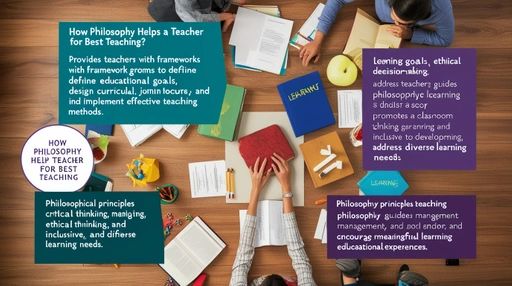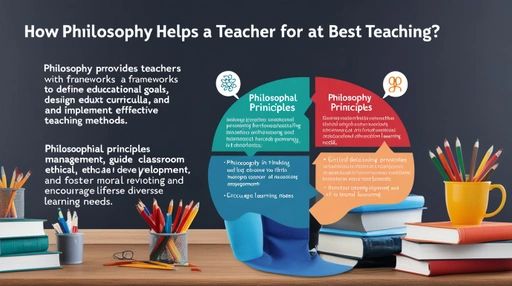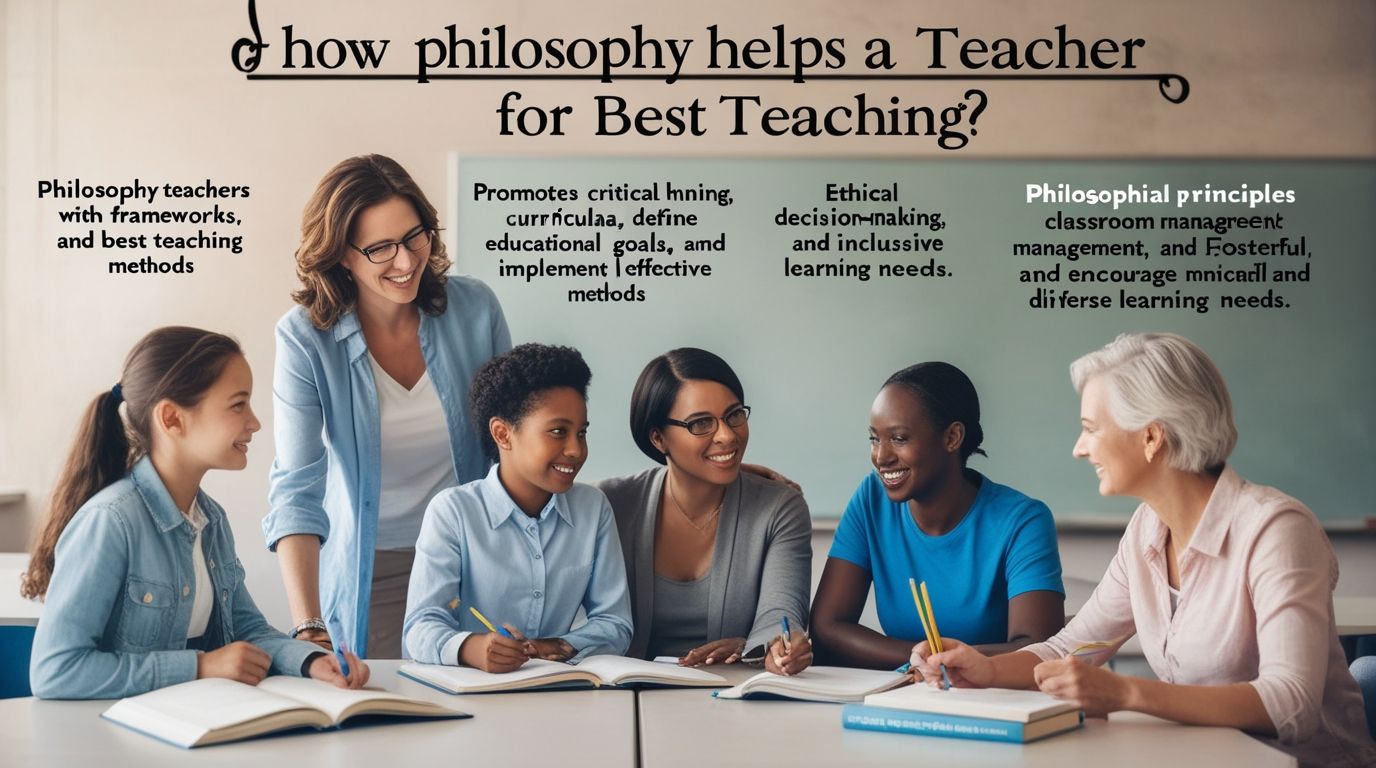Introduction
How Philosophy Helps a Teacher for Best Teaching, Philosophy has long been regarded as the cornerstone of education, shaping ideas, methodologies, and approaches to teaching and learning. Teachers, as facilitators of knowledge, rely on philosophical principles to create structured, ethical, and effective classroom environments. Philosophy not only defines the purpose of education but also provides teachers with frameworks for curriculum development, student engagement, and moral guidance. This article explores how philosophy aids teachers in achieving excellence in teaching by focusing on its foundational theories, approaches, and practical applications.
1. Philosophy as the Foundation of Educational Theories
Philosophy serves as the foundation for various educational theories that inform teaching practices. Teachers draw from philosophical perspectives to determine their instructional approaches, classroom management strategies, and learning outcomes. Major educational philosophies include:
- Idealism – Focuses on the development of intellectual and moral values. Teachers using this philosophy emphasize moral development, critical thinking, and abstract reasoning.
- Realism – Stresses the importance of scientific knowledge and observable facts. Teachers employ evidence-based teaching methods, experiments, and real-world applications.
- Pragmatism – Promotes experiential learning and problem-solving. Teachers encourage students to learn by doing, emphasizing collaboration and inquiry-based learning.
- Existentialism – Values individual choice and self-expression. Teachers act as facilitators, providing students with opportunities to explore their personal values and identities.
- Constructivism – Highlights the role of active learning. Teachers create interactive and student-centered learning environments that foster inquiry and exploration.
These philosophical frameworks enable teachers to adapt their teaching methodologies to suit diverse learners and contexts.
2. Defining Educational Goals and Objectives
Philosophy helps teachers clarify their educational goals, ensuring that teaching aligns with the broader aims of education. Philosophical reflection allows teachers to address key questions:
- What is the purpose of education?
- How should knowledge be imparted?
- What values should students acquire?
For instance, an idealist teacher may prioritize moral education, while a pragmatist may focus on preparing students for real-life challenges. Philosophy thus serves as a compass, guiding teachers to set meaningful objectives that resonate with societal and individual needs.
3. Curriculum Development and Content Selection
Philosophy influences curriculum design by determining what content is relevant, meaningful, and appropriate. Educational philosophies like progressivism advocate for curricula that integrate life skills, critical thinking, and creativity. Conversely, perennialism emphasizes timeless knowledge, promoting classical literature and established disciplines.
Teachers utilize philosophical principles to:
- Select subject matter aligned with students’ developmental stages.
- Integrate interdisciplinary content to promote holistic learning.
- Foster intellectual and ethical growth through meaningful activities.
- Incorporate modern challenges like technology and globalization into lessons.
Thus, philosophy ensures that the curriculum meets the evolving needs of society and learners.
4. Teaching Methods and Strategies
Philosophy equips teachers with effective teaching methods rooted in logical reasoning and experimentation. Approaches derived from philosophical traditions include:
- Socratic Method – Encourages inquiry and dialogue through questions, promoting critical thinking.
- Experiential Learning – Based on pragmatism, emphasizes hands-on activities and collaborative projects.
- Constructivist Approach – Focuses on active learning, where students construct knowledge through exploration.
- Lecture and Discussion – Drawn from realism, emphasizes clarity, structure, and factual accuracy.
By understanding these methods, teachers can adapt their approaches to suit the learning styles and needs of diverse students.

5. Ethics and Moral Education
Philosophy provides teachers with ethical frameworks to address moral issues in the classroom. Philosophical concepts of justice, fairness, and equality guide teachers in creating inclusive and respectful learning environments. Ethics in education focuses on:
- Promoting fairness and impartiality.
- Addressing moral dilemmas through debate and reflection.
- Instilling values like honesty, integrity, and responsibility.
- Encouraging empathy and social responsibility.
Teachers who integrate ethical principles into their teaching foster character development and civic engagement among students.
6. Critical Thinking and Problem-Solving
Philosophy emphasizes logic, reasoning, and analytical thinking—skills essential for both teachers and students. Teachers leverage philosophical tools to:
- Develop students’ ability to evaluate arguments and evidence.
- Encourage reflective thinking and intellectual curiosity.
- Facilitate discussions that promote diverse perspectives.
- Train students to approach problems systematically and innovatively.
Such practices prepare students to become lifelong learners and independent thinkers.
7. Addressing Diversity and Inclusivity
Modern classrooms are diverse, encompassing students from various cultural, linguistic, and socio-economic backgrounds. Philosophy helps teachers adopt inclusive practices by emphasizing respect for individuality and equality. Existentialist and constructivist approaches, for example, promote personalized learning experiences that honor students’ identities.
Philosophy also guides teachers in:
- Recognizing and addressing biases.
- Encouraging cultural exchange and understanding.
- Creating safe spaces for expression and collaboration.
- Implementing differentiated instruction to meet unique learning needs.

8. Teacher-Student Relationships
Philosophy shapes the teacher-student relationship by highlighting roles and responsibilities. Philosophers like John Dewey emphasized the importance of teacher guidance while fostering student independence. Existentialists advocate for teacher empathy and authenticity to build trust.
Teachers use philosophical insights to:
- Maintain respectful and professional interactions.
- Serve as mentors and role models.
- Provide constructive feedback that supports growth.
- Balance authority with approachability.
9. Lifelong Learning and Professional Growth
Philosophy inspires teachers to view teaching as a continuous learning process. By reflecting on their practices, teachers evolve and adapt to new educational challenges. Philosophy fosters:
- Self-assessment and introspection.
- Professional ethics and accountability.
- Openness to new ideas and methodologies.
- Commitment to ongoing research and development.
Through philosophical inquiry, teachers remain innovative and resilient in their careers.
Conclusion
Philosophy is integral to effective teaching, offering a foundation for educational theories, ethical practices, and curriculum design. It enables teachers to set meaningful goals, develop inclusive strategies, and foster critical thinking among students. By embracing philosophical principles, teachers enhance their ability to inspire, educate, and empower learners. Ultimately, philosophy ensures that teaching transcends mere knowledge transfer, becoming a transformative and enriching experience for both teachers and students.
References
- Dewey, J. (1916). Democracy and Education. New York: Macmillan.
- Freire, P. (1970). Pedagogy of the Oppressed. New York: Continuum.
- Brubacher, J. S. (1969). Modern Philosophies of Education. New York: McGraw-Hill.
- Noddings, N. (1992). The Ethics of Care: Personal, Political, and Global. Berkeley: University of California Press.
- Ornstein, A. C., & Hunkins, F. P. (2017). Curriculum: Foundations, Principles, and Issues. Boston: Pearson.
- Gutek, G. L. (2009). New Perspectives on Philosophy and Education. Boston: Pearson.

7 thoughts on “How Philosophy Helps a Teacher for Best Teaching”
Comments are closed.